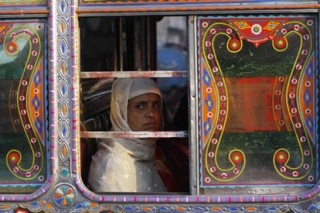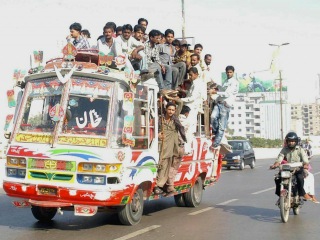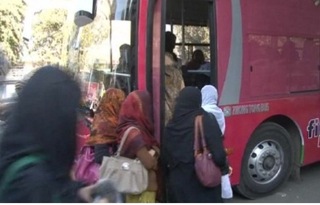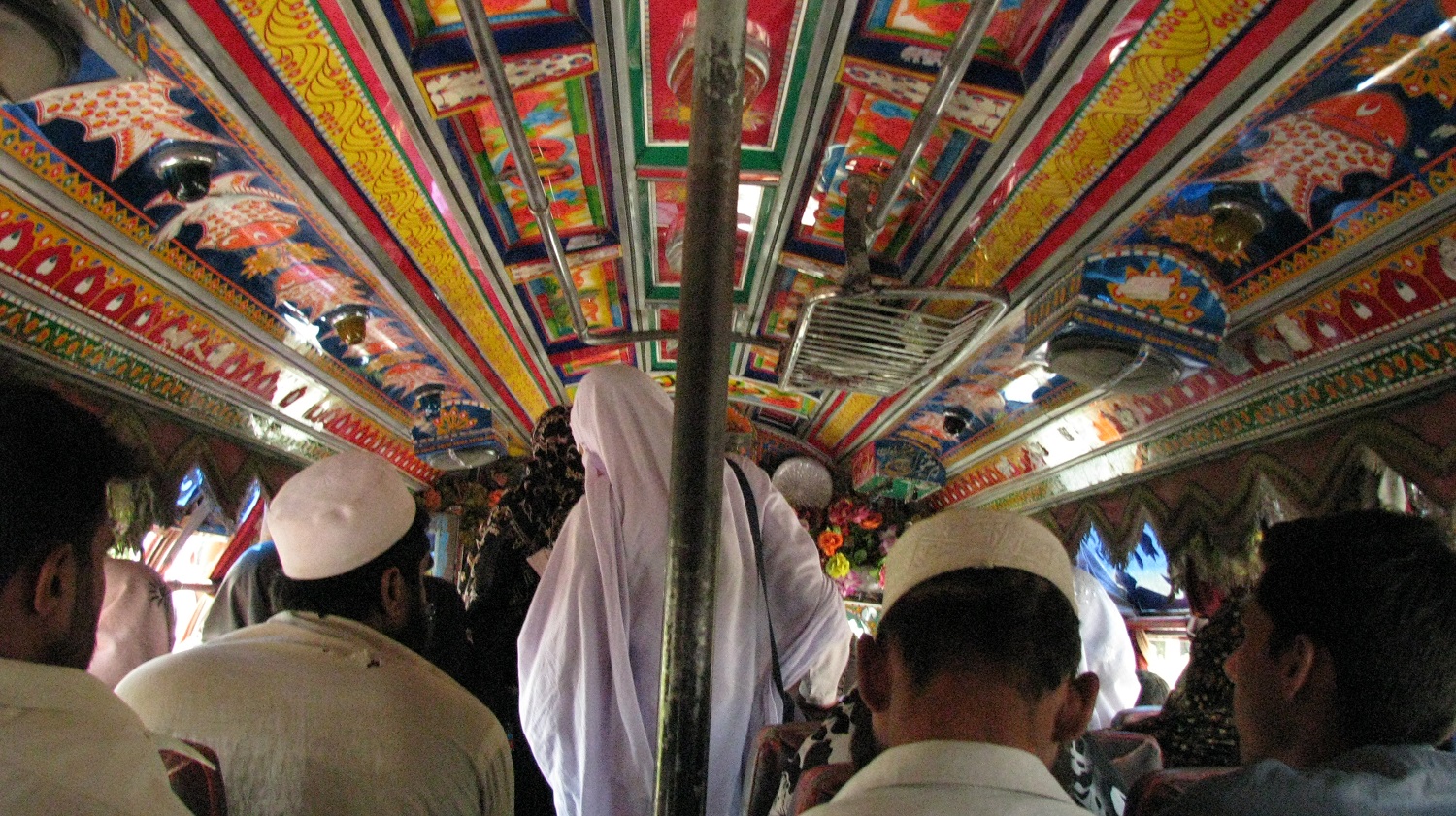The daily commute is considered a routine task by many people around the world – mundane, unchanging and more often than not, simple.
In many parts of South Asia, however, this seemingly simply task of commuting to and from work is considered difficult and often dangerous for women. An issue brought to light by the horrific gang rape in Delhi, safe, harassment-free transportation is hard to come by for many working women in the region.
Women often complain of being harassed, inappropriately touched and humiliated on buses, but there’s not much they can do about it. In Pakistan, for example, the first two seats near the driver are reserved for women. The rest of the bus, however, is for men.
According to the International Labor Organization, barely one-fifth of Pakistan’s women work in paid jobs. Many women say a lack of safe and secure transportation is one of the reasons many skilled and educated women are unable to make ends meet and earn their way into a better life.
Karachi-based social enterprise Naya Jeevan (meaning new life in Urdu) is seeking to change this situation for women by launching Busanti (meaning spring in Hindi), Pakistan’s first ‘public health’ bus service for women that aims to provide “a safe and dignified vehicle for public transport while offering women access to affordable health plan coupled to preventative health education.”
 The cost of health care alone in Pakistan drives almost 7 million people into poverty every year, according to a 2010 World Bank report.
The cost of health care alone in Pakistan drives almost 7 million people into poverty every year, according to a 2010 World Bank report.
The name ‘Busanti’ was inspired by the iconic Bollywood character Basanti – a bold and feisty young woman who makes her living driving a horse-cart in the Bollywood blockbuster, Sholay. This initiative, however, has enormous potential to create change for women by addressing more than one crucial regional issue in one simple bus ride.
This innovative initiative was also recently selected as a winner in the Women Powering Work: Innovations for Economic Equality in the MENA Region competition, launched by Ashoka Changemakers and GE. Naya Jeevan founder, Asher Hasan, is also an Ashoka fellow. We had a chance to speak with Seher Hafeez, Brand Strategy & Partnerships Manager of Naya Jeevan, about the impact of their work:
Elan: Tell us a little about the Busanti initiative. How did it get started and what was the inspiration behind it?
Seher Hafeez: Busanti, Pakistan’s first women’s only “public health” bus meets women at the crossroads of Social & Technological Innovation. Bridging two unaddressed market needs, access to safe transport and quality healthcare for women, it will not only transport women safely to where they need to go but will also provide them with much needed preventive health education and access to resources while on the go.
Busanti also has a pioneering a pre-paid bus pass option (via a smart card) that further facilitates services for women. Linked to the National ID program, many women will now have the option to be registered officially and have a formal ID for the first time. The card also allows employers the opportunity to pre-pay or subsidize the fare and even add-on monthly health insurance.
The true inspiration for the idea and the actual driving force for Busanti are the low-income women who have to commute to and from work every day using public buses. We would often discuss the horrendous stories of these women at work to the point where we took an office initiative to see what a day in the life of a female commuter was really like. Members of our team (including the men dressed like women) took to the streets of Karachi and were shocked to see the first hand the level of harassment and danger that marginalized women have to face on a daily basis. We knew we had to do something about this.
Elan: Why is this initiative crucial for women in Pakistan right now?
SH: As the global lens fell on the New Delhi bus gang rape in December 2012, this old, yet ignored issue came to light. In one woman’s tragedy, the reality of millions of women was illuminated. But the real tragedy is that this problem still exists and in fast is worsening with migration towards congested urban megacities. Millions of women in South Asia still go on like this because they have no other option.
While there is a big push globally to close the gender gap for women- sadly if we zoom the lens in on Pakistan what we discover is that here the gap is widening even more and per the 2013 Gender Gap Report- Pakistan has fallen and is now ranked 2ndworst in gender equality.
 If you look at the women who typically commute by public transport in Pakistan they tend to be the urban working poor earning between $2-8 per day. Women belonging to lower socio-economic strata already have numerous challenges to deal with. If the physical and mental stresses that accompany them daily as they commute to work on unreliable, untimely, unsafe and undignified transport are not enough – these women don’t even have access to basic, quality healthcare or financial inclusion.
If you look at the women who typically commute by public transport in Pakistan they tend to be the urban working poor earning between $2-8 per day. Women belonging to lower socio-economic strata already have numerous challenges to deal with. If the physical and mental stresses that accompany them daily as they commute to work on unreliable, untimely, unsafe and undignified transport are not enough – these women don’t even have access to basic, quality healthcare or financial inclusion.
Accessibility to basic needs such as healthcare, education and socioeconomic inclusion is a major crisis in Pakistan and this initiative is crucial for women from that perspective. Not only does Busanti provide safe and dignified transport but it also provides access to quality healthcare and mobile financial services.
Elan: Tell me about the culture of traveling as a woman in Pakistan. Why is considered dangerous to do something as simple as traveling to work every day?
SH: People living in Karachi are not blind to the reality that exists for women who commute (although not everyone chooses to see). Before the actual bus ride even starts- the first challenge is actually getting onto a public city bus. Women waste hours daily because the buses are overcrowded, mostly with men who are jammed into the buses, hanging off the side and even sitting perilously on top of buses. Women, on the other hand, have a very small, confined area within the bus, typically no more than 4 seats.
Standing and waiting for the bus is also stressful as women are openly harassed, greeted with lewd and derogatory remarks and inappropriately propositioned by men passing by. Women are even followed around as they walk to the bus stop. It is very common for women to wear loose cloaks (chadors) while commuting and walk with other women to avoid unnecessary and unwelcome interaction with members of the opposite sex.
Once they are sandwiched inside the bus, women try and stay clustered in the very small area designated for women but this does not stop men from reaching over and physically groping them and making sexual advances.
Here is a quick 2-minute video that shows a look inside the bus.
This situation is not new to any of these female commuters, They are just resigned to this experience because no affordable option currently exists. For many families who cannot afford any other means of transport, women are restricted from working, going to school/university or going out alone. For those working women, for whom work is a matter of survival, they have no other choice but to venture out and pay the toll that is a detriment to their own physical and mental health.
Elan: Tell us more about the “public health” aspect of your initiative.
SH: Many low-income women have never been educated on the very basics of their own health and access to quality and affordable healthcare remains elusive to them. By understanding their unmet needs, Busanti offers a solution that meets their holistic health needs.
During their commute, women are provided with health education on relevant women’s health and maternal-child health issues using media such as video. Embedded in a bus pass is a monthly health insurance plan. We also want to connect women with existing healthcare resources in the community and bridge them via 24/7 tele-health lines to healthcare providers for medical consultation. Bus routes are also being planned so that women can easily access quality healthcare venues that are accessible along the route.
These are all simple and effective ways to educate women on how they can take better care of themselves, their families and communities and have greater impact on the overall wellness of society.
Elan: What are some of the barriers you have had/ are continuing to face with the launch of this initiative? How did you overcome them?
SH: Prior to launch, we have had to consider many factors. Finding the right partner was key and we are excited to be working with Daewoo, which is like the Greyhound or Megabus equivalent in Pakistan. Daewoo has had tremendous success in Pakistan with its express inter-city bus service, which has expanded nationwide over the past 15 years, and Busanti will be Pakistan’s first intra-city metro bus service for women.
 The idea of a woman’s bus is not new. The ‘Pink bus’ was a women’s only bus that was introduced by the Punjab government as an innovative public-private partnership in 2010 but failed to take off because of the failure of the administration to enforce a women only policy, which essentially converted it into a regular public bus. All of our buses will have a male bus driver who is versed in gender sensitization and an armed security guard trained to diffuse adverse situations. Security guards will have emergency back-up support of a professional security agency for the pilot program.
The idea of a woman’s bus is not new. The ‘Pink bus’ was a women’s only bus that was introduced by the Punjab government as an innovative public-private partnership in 2010 but failed to take off because of the failure of the administration to enforce a women only policy, which essentially converted it into a regular public bus. All of our buses will have a male bus driver who is versed in gender sensitization and an armed security guard trained to diffuse adverse situations. Security guards will have emergency back-up support of a professional security agency for the pilot program.
Most buses in Pakistan also run on Compressed Natural Gas (CNG), an eco-friendly and cost-effective alternative to petrol/gasoline. Unfortunately the supply of CNG in Pakistan has been unreliable with sporadic CNG rationing. This could potentially hamper streamlined operations unless there is an effective mechanism to store the CNG in special storage tanks. Fortunately, Daewoo has made special arrangements for supply of CNG to avert a fuel shortage.
Elan: Why do you think entrepreneurship and economic equality is so important in the Middle East?
SH: Entrepreneurship and economic equality are just as important in this region as they are anywhere else in the world. In Pakistan, where basic public services such as health, education and law-enforcement are dysfunctional, we see more entrepreneurs stepping up with creative and sustainable solutions for our socio-economic problems.
Elan: What advice would you give to women who are seeking to overcome obstacles in terms of employment in the South Asian region?
SH: The name ‘Busanti’ is inspired by the iconic Bollywood character Basanti who features in the 1976 blockbuster movie, ‘Sholay’ (Flames). Basanti was bold, brazen and beautiful. She lived in a village where she literally drove change by being the only female “tangey-wali” or carriage-driver. She commanded everyone’s respect.
My advice is to be strong like Basanti. Be creative, remain resilient and stay focused on your goals while driving the change you want to see.
Editor’s Note: Additional information about the competition, assessment criteria and fascinating trends that are emerging from the finalists’ solutions can be found at www.changemakers.com/MENAwomen.
Follow #womenWork on Twitter to receive the latest on trends and competition news.
Photo Credit: germeister via Compfight cc




















This is an incredible article. Their work should be highlighted, unfortunately Pakistan isn’t reported on in the most positive of ways :/
Thats a great initiative. It would make a huge difference in the lives of those women, the idea of public health awareness while on the go is superb. I hope this project prospers, grows and touches lives. Best of luck
[…] Busanti: Making the daily commute safer and ‘healthier’ for working women in Pakistan. January 15th, 2014. […]